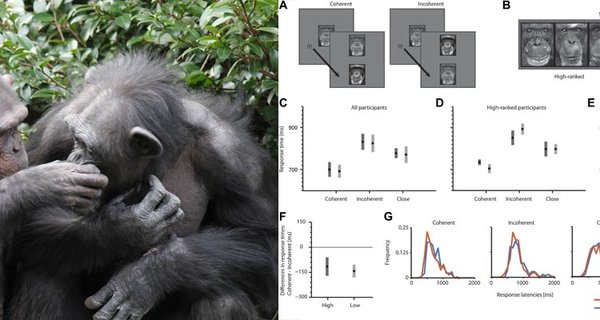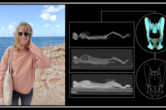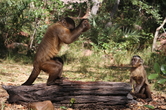The Metaphorical Chimpanzee

A new study led by CICASP's Dr. Ikuma Adachi shows that the use of metaphorical concepts is not unique to humans.The article was published in the open access journal eLife.
Chimpanzees use metaphors
The ability to connect abstract concepts to something physical helps us to understand abstract ideas. Examples include using conceptual metaphors that draw parallels between something abstract, such as social status, and physical position, even though there is no connection between them, e.g. using phrases such as ‘top dog’ or ‘upper class’. It has long been assumed that the use of such conceptual metaphors is uniquely human.
Many social animals have hierarchies of dominance within groups, with particular individuals being ranked above or below other individuals. Chimpanzees—our closest relatives in the animal kingdom—are a good example of this, and although their cognitive processes are known to be similar to those of humans in many ways, we do not know if they make use of conceptual metaphors. We don’t even know if conceptual metaphors can exist in the absence of language.
When researchers want to investigate how concepts are cognitively linked in the brain, they often use ‘coherent’ or ‘incoherent’ stimuli. A good example of an incoherent stimulus would be the word ‘red’ printed in blue ink. Because our neural representations of the color blue and the word blue are linked, it is harder for a person to read the word red when it is printed in blue than when it is printed in red (which would be a coherent stimulus).
To test whether chimpanzees use a conceptual metaphor in which social status corresponds to height, Christoph Dahl (now at National Taiwan University) and Ikuma Adachi presented photographs to six chimpanzees of four other chimpanzees who were known to them, and tested whether the relative positions of the photographs affected the ability of the chimpanzees to identify which of the two photographs they had been shown earlier. For example, a photograph of a high-ranked, dominant chimpanzee could be shown above a photograph of a lower-ranked chimpanzee (a coherent stimulus) or below a photograph of a lower-ranked chimpanzee (an incoherent stimulus). The chimpanzees doing the tests had to identify which of the photographs they had been shown earlier by touching the correct photograph on a screen.
The results showed that it took longer for chimpanzees to complete the task when the photograph was in the ‘wrong’ position. This suggests that the neural representations of social status and physical position might be linked in chimpanzees. If the social status and the physical position of the photograph match, the chimpanzee doing the test can quickly identify the photograph that it has been shown earlier. However, if they do not match, the conflict between the neural representations of social status and physical position slows down the response. These findings suggest that conceptual metaphors are not uniquely human and, moreover, that they could have emerged before the development of language.
Access the full article at eLife, and listen to Dr. Adachi discuss this work on the eLife podcast.











